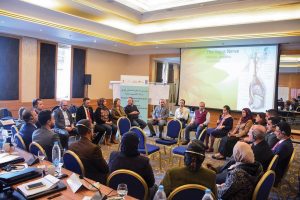
IN EARLY FEBRUARY 2018, 20 scholars from five leading Iraqi universities and a representative from Iraq’s Ministry of Education gathered in Beirut, Lebanon, for a five-day training on conflict analysis. The diverse group – which included both men and women representing Sunni, Shia and Assyrian Christian faiths – would lay the foundation for their eventual development of a peace education curriculum for Iraqi university students.
“They were passionate in jointly exploring systemic dynamics of conflicts in Iraq. This was a first for most, given the divides in recent decades,” said Catherine Barnes, a CJP professor who has taught and facilitated peacebuilding processes in more than 30 countries.
The training was part of a multi-phase, multi-year peacebuilding project with youth and academics in Iraq that has involved several CJP faculty and alumni. The $1.3-million initiative, funded by the United Nations Development Programme (UNDP), was jointly implemented by CJP, Kufa University and two NGOs, the Iraqi Al-Amal Association and the Imam Al-Khoei Foundation.
SUPPORTING PROJECTS IN IRAQ
The project’s second phase with youth concluded in April 2018, having provided five total trainings since beginning in fall 2017. Seventy-five youth, selected in a competitive application process, were supported in the creation and implementation of interfaith peace projects in communities across Iraq.
The academic trainings involved 46 scholars and educators, with the goal of creating a common peacebuilding curriculum to be taught in five Iraqi universities.
As key stakeholders in Iraqi social fabric, youth and academics are “seen as instrumental in strengthening social cohesion and promoting civil society initiatives and dialogue between various ethnic and religious groups,” according to the project grant.
“We estimate that the trainings and youth peace projects touched hundreds of lives and will have exponential benefits to the region in the future,” said Daryl Byler, CJP’s executive director. “Both the young people and the academics are empowered to continue their work, and to adapt their learnings in meaningful and sustainable ways.”
LAYING THE FOUNDATION FOR PEACE EDUCATION IN IRAQ
The academic trainings support the promotion of a peace education framework for reconciliation.
Participants included professors of the humanities, political science and law from universities of Anbar, Baghdad, Karbala, Kufa and Tikrit.
“An initial goal of the project was to help equip educators to teach the subject of peacebuilding and conflict resolution in their university classrooms and to support them to serve as resources for the development of peace education in Iraq,” said Alma Abdul-Hadi Jadallah, a consultant and professor who regularly teaches at CJP’s Summer Peacebuilding Institute.
Participants showed determination to initiate change and valued an approach that was respectful of cultural traditions and knowledge, she added.
Jadallah, who is also president and managing director of the Fairfax, Virginia-based firm Kommon Denominator, has been involved in all phases of the project since it began in October 2016. She has conducted six youth workshops and four workshops for academics.
CONFLICT: ‘AN INTRINSIC HUMAN PHENOMENON’
Barnes’ agenda for the recent workshop included theories and models of conflict analysis, conflict perceptions and relationship lenses, conflicts as systems, and political economy. Participants collaboratively constructed a 100-year timeline of Iraq, leading to an illuminating dialogue on underlying issues, patterns and turning points in their shared history. They also jointly analyzed current conflict “drivers” and the political economy system in Iraq. A final day highlighted the psychosocial dimensions of conflict, including discussions of dignity, trauma and the cycle of violence.
“One important conceptual foundation that we discussed was that conflict is an intrinsic human phenomena that crosses scale barriers, and needs a holistic and interdisciplinary approach to understand and work with it,” Barnes said. “That’s why it was really beneficial to have humanities professors in the room with political science professors, and to use interactive exercises and dialogical discussions, instead of a lecture model, to build participants’ analytic skills regarding an understanding of conflict.”
Aala Ali MA ‘14, UNDP development officer, was one of the “visionaries” of this project, according to Byler. Contributors included Myriam Aziz MA ‘17, of Lebanon; Cynthia Nassif MA ‘14, of Lebanon; and Najla El Mangoush MA ‘15 of Libya (Nassif and El Mangoush are doctoral students at George Mason University); Ahmed Tarik MA ‘16, of Iraq; and Professor Carl Stauffer MA ‘02. Professor Jayne Docherty was also involved in early curriculum development.